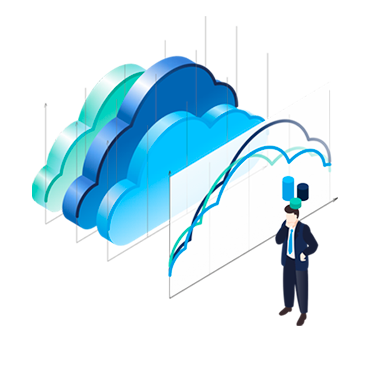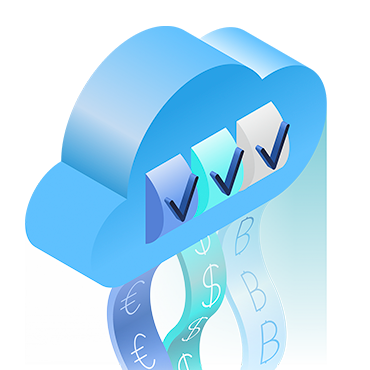Should I buy cloud services directly from the provider?
Updated 14 Dec 2021
From reducing IT costs to accelerating innovation, there are many compelling reasons to embark on a cloud migration journey.
The idea of migrating your data to the cloud may sound like a copy and paste task, but in reality, there are challenges, pitfalls, and many things to consider. This article defines and provides an overview of the cloud data migration process and suggests the best practices to turn it into a value-increasing opportunity for your business.
Cloud business process services
There are many cloud solutions. Most of them are designed to meet specific business needs, so cloud migration is always a flexible and business-tailored process.
With every year that passes, it becomes ever more apparent that migrating to the cloud is the only way for companies to truly compete and remain relevant in the long-term.
A growing number of businesses, from freshly-launched start-ups to Fortune 500 giants, are adopting cloud computing, meaning CIOs and business owners alike are met with an overwhelming number of providers, features, products, services, hybrid solutions and training options to consider.
Every organization has its own technological fingerprint; its own distinct set of requirements, goals, and operational nuances that need to be taken into consideration.
Let’s take a closer look at the top three names in the industry: Amazon Web Services (AWS), Microsoft Azure, and Google Cloud.
AWS: Pros and cons
AWS jumped into the game early as the very first major cloud vendor in the space around 12 years ago, claiming an impressive 33% of market share and generating $1.4bn for Amazon in Q1 2018 alone.
The biggest strength AWS possesses is undoubtedly its maturity and dominance in the public cloud market, with its success and popularity linked to the sheer scale of its operation.
Today, it stands tall as the most established and enterprise-ready vendor, offering perhaps the richest of capabilities when it comes to overseeing a massive number of resources and users.
Microsoft Azure is gaining ground as the preferred service for existing Microsoft customers, with Google’s offering entering the cloud battleground relatively recently as a ‘leader’. While other formidable competitors such as Alibaba Cloud and Oracle Cloud have increased in popularity over the last few years, AWS remains a strong front runner in the cloud computing industry, with competitors Azure and Google Cloud carving out their own modest share of the market.
Microsoft Azure: Pros and cons
Microsoft showed up on the cloud scene a little later than AWS, but certainly made up for it by adapting its existing on-premises offerings for the cloud.
Seven years since its initial launch, Azure is a strong competitor to AWS, providing businesses with a great range of features, robust open-source support, and straightforward integration with other Microsoft tools.
As a Microsoft product, Azure no doubt benefits from user familiarity with the brand, which creates an immediate preference for Azure among loyal Microsoft customers.
While Azure is indeed classed as an enterprise-ready platform, in its aforementioned Magic Quadrant report, Gartner noted that many users feel that “the service experience feels less enterprise-ready than they expected, given Microsoft’s long history as an enterprise vendor”.
Users also cited issues with technical support, training, and DevOps support as some primary pain-points when using the provider.
Google Cloud: Pros and cons
As a latecomer to the cloud market, Google Cloud Platform (GCP) naturally offers a more limited range of services and doesn’t command the same global spread of data centers offered by AWS and Azure.
It does, however, give customers a highly-specialized service in three main streams: big data, machine learning, and analytics, with good scale and stable load balancing, as well as those famously low response times. Google’s container offering provides users with a significant advantage as it developed the very Kubernetes standard now utilized by competitors AWS and Azure.
Customers tend to choose GCP as a secondary vendor in a hybrid solution, though it is becoming increasingly popular with organizations that are direct competitors with Amazon, and ,therefore, cannot use AWS. It’s important to note that GCP is very open-source and DevOps-centric, and as a result, does not integrate as well with Microsoft Azure.
Why and when do you need to migrate to the cloud?
Moving to the cloud is a choice most modern companies are having to make. Below are some examples of when a company may decide to move to the cloud.
-Move from a legacy system. 40% of companies that migrate to the cloud from a legacy system do it to improve the security of their data. Cloud data migration also allows a company to deal with legacy system tech limitations.
-Get a competitive advantage. Migration to the cloud is also an opportunity to create a competitive advantage because of the possibility of cutting costs and making employee workflow more flexible. Time and money can also be redirected to other tasks aimed at business growth. Moreover, cloud migration creates new opportunities for businesses to leverage more efficiency when employees are working from home. In such an environment, using the cloud for data management is the best choice.
Conclusion
When looking for the right cloud vendor for your enterprise, be sure to consider your particular requirements and workload, and remember that the answer could indeed lie in a combination of two or three cloud providers. Migrations as a whole, whether from a legacy system to the cloud or from a cloud to another cloud, can be hugely beneficial.
While providing many notable benefits to do with efficiency and business infrastructure, one of the most notable advantages comes in the form of improved security, more compliant security, and cheaper security. Outdated legacy systems in the form of private servers are costly and require a lot of attention to maintain the level of efficiency and security of advanced cloud solutions. Popular cloud providers, on the other hand, have built their cloud from the ground up with state-of-the-art security and many other notable benefits.
So one might wonder how to choose? Book a free consultation with us and we will help you figure out all the intricacies.



